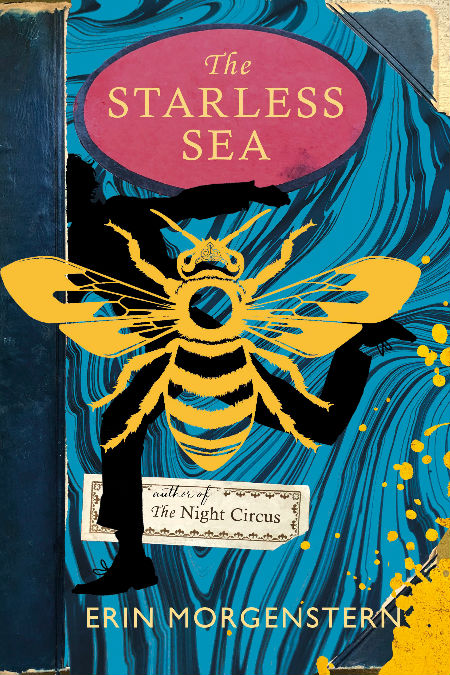
Imagination is a necessary ingredient in every work of fiction you read.
Whether it’s brilliantly or prosaically exercised, the ability of a writer to take an idea and run with it such that you, as the reader, have no choice but to run right alongside them, is one of the great gifts of opening a book.
There are some authors who take this gift and burnish it to a such a staggeringly beautiful lustre that the world, and thus the story, they bring forth is so wondrous, so lustrously escapist that it is impossible to imagine (yes, you are compelled to do it too but then, how can you not?) how your life ever existed without it.
Erin Morgenstern, who gave us the brilliantly-written, emotionally-resonant delights of The Night Circus, returns with The Starless Sea, a novel so saturated in imaginative endeavour, and consistently, wildly, affectingly so, that before you know it, much like the protagonist Zachary Ezra Rawkins, you are drawn into its galloping, expansive adventures, happy to stay in the mystically real world she creates for the duration (and like all good books, long beyond).
“Zachary Ezra Rawlins is on campus to read. He feels mildly guilty about this fact, as he should be spending his precious winter hours playing (and replaying, and analyzing) video games in preparation for his thesis. But he spends so much time in front of screens he has a near-compulsive need to let his eyeballs rest on paper. He reminds himself that there is plenty of subject overlap, though he had found subject overlap between video games and just about anything.” (P. 16)
It starts, as all great books suffused with this much fantastical bravura must, with a leaping vault of imagination.
Zachary, a handsomely nerd-ish gay graduate student with few friends or acquaintances save for the doggedly spirited Kat Hawkins, who comes to play a far greater role in his story than either of them ever imagined – the word “story” crops up a great deal but in a tale that is vibrantly about creating our own stories and sometimes those of others, that makes perfect sense – comes across a mysterious book that has been mis-filed deep in the shelving of the university library that is his second home.
Full of poetically moving stories of pirates and beautiful jailers, cities lost in time and those who long to learn and live and grow however great the cost, the book is an amazing read, one that becomes greatly disquieting, despite Zachary’s bets efforts to repress it, when he finds one of his childhood memories written up as a chapter in the book.
He tries all kinds of rationalisations to explain it away, as any of us would do since the fantastical popping up in the banal surrounds of the everyday is never an easy thing to process, but fails, realising he has a mightily mystifying puzzle on his hands, one that can only be solved by going places he has never gone before.
Places that, rather intriguingly, can only be gained admittance to by a beguilingly variety of doors, similar to the one that he found painted on the wall of the alley outside of his mother’s fortune telling establishment when he was a young teenager and through which, to his great regret, he never went.

Guided by a trio of symbols – a bee, a key and a sword – which recur throughout the book in an array of dizzyingly enthralling ways, Zachary makes his way through a masquerade ball in New York, the interior of a secretive club in which resides both mortal threat and imaginative promise, and a door, beyond which exists a world unlike anything he has ever known.
He is joined by new “friends” (their status is uncertain for much of the first part of the story) Dorian and Mirabel, companions on this journey to end all journeys, which takes place far below the surface world, in which are stored stories without counting, tended to by people who have devoted their lives to their tending, and populated by creatures who promise wonder as much as existential loss.
While a world this unusual and utterly removed from his own up to that point might seem to have nothing to do with him, the book he found in the university library and the people he meets in the once-richly filled ballrooms, tunnels and sumptuously-appointed and catered rooms of the world below, vividly suggest otherwise, intimately woven into his life in ways so profound there is no choice but to engage with them.
Part rollicking good adventure, and part metaphysical journey into realms where the sea is made of honey and the prey of the ruling owls is something else entirely besides rats and mice, The Starless Sea is a gorgeously imaginative journey into the very heart of what makes us up our lives.
We are, after all if we think about it, the product of a myriad choices we make and those made by others, whether deeply entwined into our lives or not, and we cannot exist without these decisions, whether they bode good or ill.
“The son of the fortune-teller sits in a chair surrounded by keys in the middle of a starlit forest talking to a woman made of snow and ice.
At first he does not know what to say.
He does not think of himself as a storyteller. He never has.
He thinks of all the tales he grew up feasting on, myths and fairy tales and cartoons.
He remembers Sweet Sorrows and its test for keepers, the storytellers surrounded by keys and how they could tell any story but their own, but he does not have a story.
He has nothing practiced. Nothing prepared. But the request is so open-ended.
Tell me a story.” (P. 424)
In the every day pages of our own stories, many of these decisions are barely noticeable, glancing off us with nary a visible blow while others leave a gaping, almost fatal wound, but in the rich surrounds of The Starless Sea they are made manifest, writ large in ways both exciting and terrifying.
Morgenstern does a brilliant job of elevating us into wonderfully magical realms while keeping characters like Zachary and Dorian, and even the mercurially vivacious Mirabel, grounded in such a deeply authentic human way that many of the stories twists and turns, which could feel weirdly removed from us because of the extravagantly otherworldly setting, hit home with immense power and ferocity of emotion.
For all of its imaginative elements and they are present in gloriously alive profusion, The Starless Sea is a book that is, at its heart, about the stories that define us and bring us to life, that damn us and free us, lift us up and slam us down so forcefully we wonder if we’ll ever get up again.
It’s a brilliantly affecting work of fiction that takes us a thrillingly unsettling but intriguing premise and runs with it so exquisitely well, that you have no choice but to follow along with Zachary’s own unpredictable journey, pondering as you do so what your own life story would look like if it was so presented and how you might respond to the decisions and choices of your life made flesh, and finally, where your own responses might take you to places far beyond your own imagining or perhaps, most unnervingly, to the very heart of who you are.